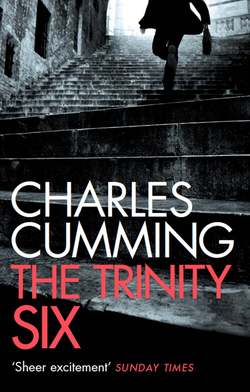Читать книгу The Trinity Six - Charles Cumming - Страница 11
ОглавлениеChapter 5
Alexander Grek had been watching the Berg residence for five hours. He had witnessed Paul returning from work with two bulging Waitrose carrier bags at 18.45. While smoking a cigarette at 19.12, he had seen Charlotte at the first-floor window, recently emerged from a bath or shower, closing a set of curtains after securing a towel around her chest. Just after eight o’clock, an unidentified white male – early forties, dishevelled hair, carrying two bottles of red wine – had entered the property. Grek assumed that the man was coming for supper.
The unidentified male left the building at 23.21. He was approximately six feet tall, about eighty kilos, wearing a corduroy jacket with a leather satchel slung over his shoulder. The man shook Paul Berg’s hand in the doorway of the house. He then embraced and kissed Berg’s wife, Charlotte. Grek had a long-lens camera on the passenger seat of his car, but was unable to take a photograph of the man’s face because he walked backwards from the front door, moving towards the street while continuing to converse with his hosts. Having reached the pavement, the subject walked in the direction of Hampstead High Street, away from Grek’s vehicle.
Grek decided to stretch his legs. He followed the subject the length of Pilgrim’s Lane and observed him hailing a cab outside a branch of Waterstone’s bookshop. The taxi headed south. Grek lit a cigarette and walked back towards his vehicle. Halfway along the street, clamping the cigarette between his lips, he urinated at the base of a chestnut tree concealed from the street by a tarpaulin-covered skip.
Murders, he had long ago concluded, broke down into three distinct categories. They could be political, they could be military, and they could have a moral characteristic. Alexander Grek did not concern himself with conventional morality. His work was either military or political, and usually defensive. Tonight’s plan, for example, had the laudable goal of preventing graver consequences for his government. Grek was not an assassin in the formal sense. He could not be hired. As a young man, he had been trained by his country’s domestic intelligence service – commonly known as the FSB – and, following his retirement in 1996, had run a small, highly successful security company with offices in London and St Petersburg. In such circumstances, a man learns a great deal about the business of death. Yet Grek considered himself, first and foremost, a political animal. The ATTILA investigation was a threat to the state. That threat must therefore be removed. He was simply responding to his patriotic duty.
Setting down a half-empty bottle of mineral water, he pulled a woollen hat low over his head, exited the vehicle and walked across the street. Pilgrim’s Lane was deserted. Grek moved towards the eastern side of the house and picked the simple lock on the wooden gate which led into the garden. He had oiled the hinges the previous night so that the gate opened without a sound. He was now in a narrow channel in which were kept a bicycle, some garden tools and several rusted cans of paint. He looked up at the house to ensure that no lights were on in the upper floors. He then walked across the garden.
During the day, Charlotte Berg worked in a converted shed at the southern end of the property. She used a laptop computer which, at night, was kept inside the house. The shed contained a cheap colour printer, an outdated telephone and fax machine, some filing cabinets, a battered wooden chair and one or two photographs of sentimental value. To Paul, she would argue that it was better to keep the shed unlocked rather than to fit a padlock, which might convey the impression to any potential burglar that the office contained something worth stealing. Grek opened the shed, stepped inside, and closed the door behind him.
Sodium fluoracetate is a fine white powder, derived from pesticide. Odourless and inexpensive, it is commonly used as a poison to control the spread of rats in sewers. Grek had 10mg, in liquid form, in a vial which he now removed from his jacket pocket. The tiny surveillance camera, fitted in a light above Berg’s desk, had shown a small bottle of Evian, half-finished, beside the printer. Grek picked it up, poured the colourless liquid into the water and sealed the cap. Sufficient moonlight was coming into the room that he was able to remove the camera without the need for a torch. He also withdrew a listening device from the underside of Berg’s desk. He placed both items, and their tangle of wires, in the pockets of his jacket. When he had finished, Grek studied the paperwork on the desk. A telephone bill. An invoice for some painting and decorating. A copy of the second volume of The Mitrokhin Archive. Nothing which seemed to refer directly to ATTILA.
A noise outside. Something within three or four metres of the shed. Grek dropped to his knees. He heard the noise a second time and recognized it as an animal, possibly a fox. The Berg’s dog, Polly, had no access to the garden at night and would presumably be asleep indoors.
Grek stood up slowly. He opened the door of the shed and walked back along the garden. He checked the street as he emerged from the shadows of the house and crossed Pilgrim’s Lane when he was sure that he was not being observed. He unlocked the car, emptied his pockets on the passenger seat and pulled out in the direction of Hampstead High Street.
